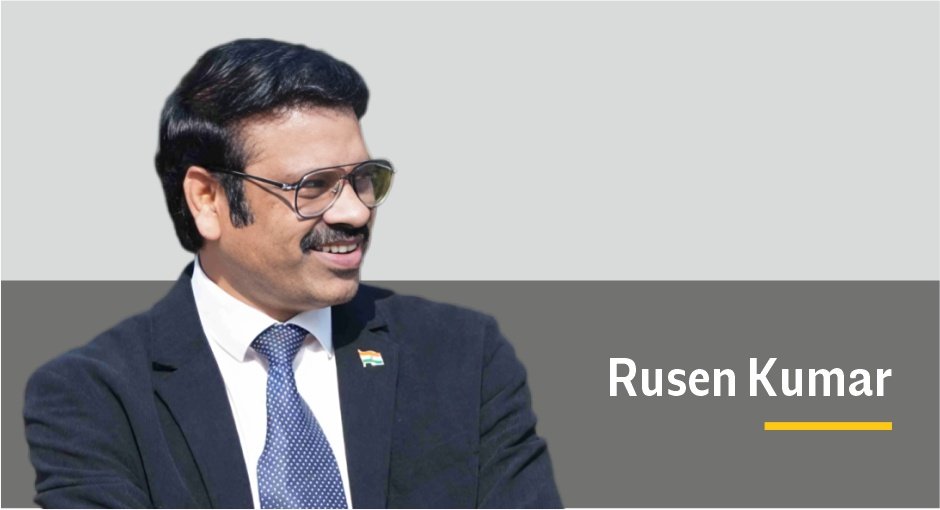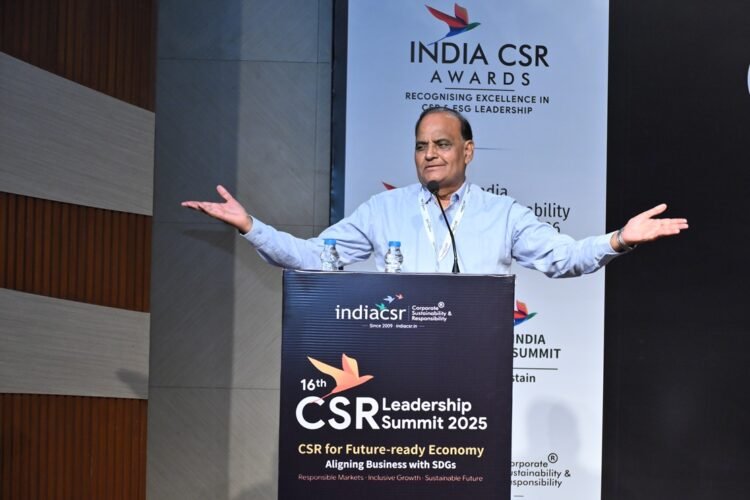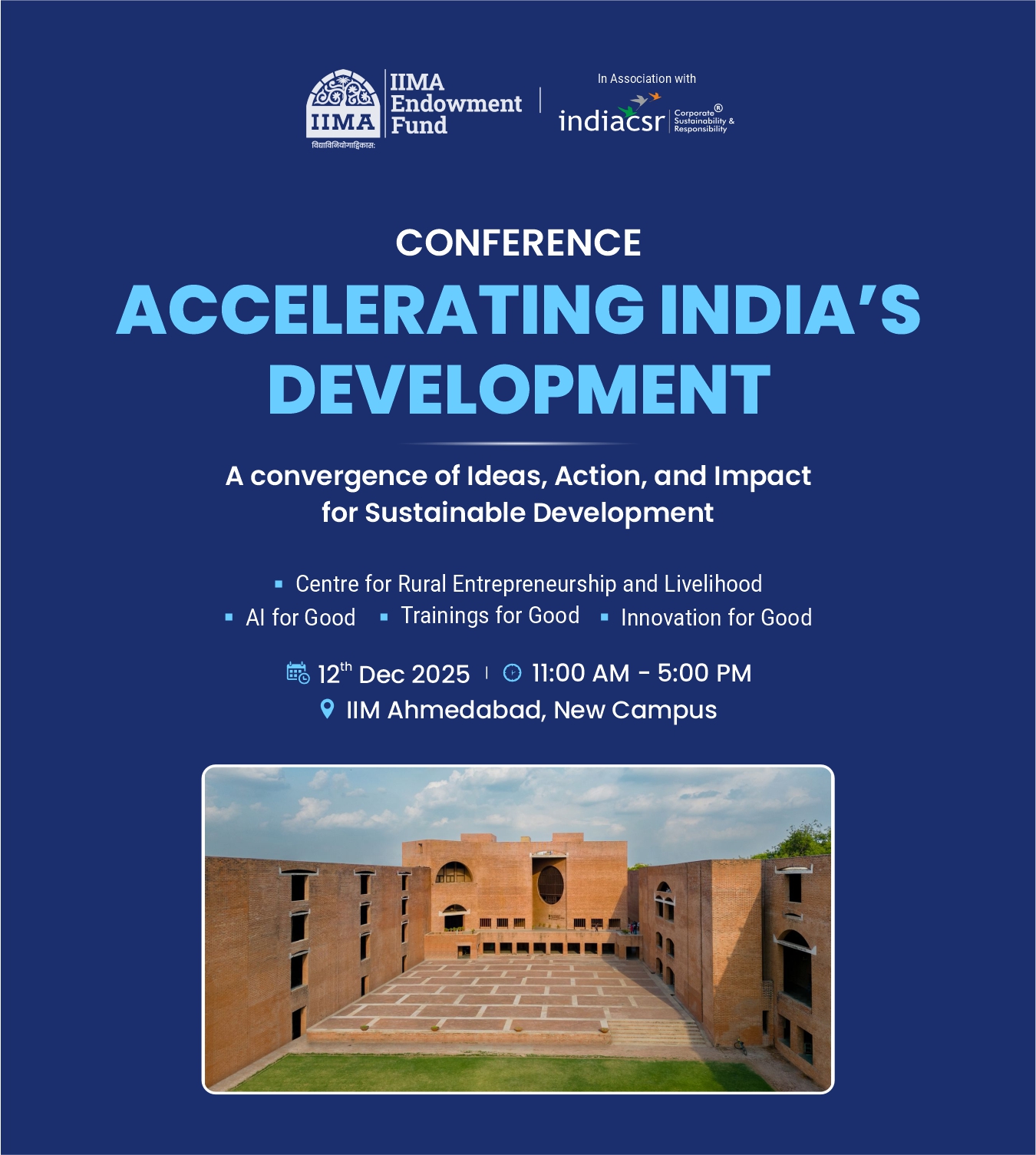Renowned Rural development leader Sita Ram Gupta explains why life must be driven by forward progression, not backward regression.

NEW DELHI (India CSR): In an exclusive and deeply insightful conversation, India CSR Editor Rusen Kumar sits down with one of India’s most respected rural development architects, Sita Ram Gupta, a man whose four-decade-long journey has transformed countless villages, empowered women and youth, and reshaped district-level development models across the country. Known for his uncompromising commitment to action and impact, Gupta embodies a philosophy that has guided his life and work: “Life is a forward progression, not a backward regression.”
This interview is not just a discussion—it is a window into the mind of a visionary who believes that progress is born from courage, clarity, and disciplined movement. As India stands at a decisive moment in its developmental trajectory, Gupta’s reflections offer a roadmap for leaders, Karmayogis, development practitioners, and every citizen seeking to contribute meaningfully to nation-building.
In this powerful conversation, he discusses the dangers of regret, the importance of empowerment, the discipline of personal development, and the responsibility each of us bears toward the marginalized. Through every answer, Gupta reinforces one timeless truth: progress belongs to those who move forward with purpose.
Edited excerpts:
Q1. What do you mean by the phrase “Life is a forward progression, not a backward regression”?
Sita Ram Gupta: “Life is a forward progression, not a backward regression.” When I say this, I emphasize that life moves forward, and our energy must also move forward with it. Forward progression is not merely physical movement—it is a mental discipline, an emotional decision, and a social responsibility. Progression demands clarity of purpose, courage in action, and consistency in effort, especially in the development sector where hesitation can cost people precious opportunities.
“In development work, forward progression means taking decisive steps where delay can cost lives, dignity, or opportunity. Regression is a luxury we cannot afford.” I have seen that when leaders or communities freeze in regret or fear, they lose momentum. Forward progression is about acknowledging our challenges but refusing to be defined by them. It is about choosing action over anxiety, hope over hesitation, and commitment over confusion.
Q2. Why do you believe looking backward or regretting holds people and communities back?
Sita Ram Gupta: “Regression is emotional stagnation. When communities stay stuck in their past—failures, injustices, struggles—they lose the ability to imagine a better future.” Backward regression traps individuals and societies in cycles of bitterness and helplessness. I have observed that regression creates internal blocks—people start doubting their ability to change their circumstances, and communities begin viewing progress as impossible. This mindset prevents innovation, limits ambition, and weakens the social fabric. When people constantly revisit their past losses, they fail to notice present opportunities.
Regression also fuels fear of experimentation; communities avoid trying new solutions because they are haunted by previous failures. Development requires movement, experimentation, and the willingness to embrace uncertainty. Regression kills this spirit. For marginalized communities especially, progress becomes impossible if they carry the weight of regret. They must replace regret with resolution, and sorrow with strategy, to build a future that is better than their past.
Q3. How has this philosophy shaped your work in rural development?
Sita Ram Gupta: This philosophy has guided every decision I took at the Lupin Human Welfare & Research Foundation (LHWRF). Forward progression became my compass. When working with rural communities, I learned that timely action can transform lives, whereas delays can destroy hope. My work with women’s empowerment, youth skilling, and district transformation was built on this belief. We encouraged women to enter entrepreneurship, form SHGs, and claim financial independence. For youth, we created opportunities through skilling centres and village enterprises because waiting would have meant losing an entire generation.
“Had we waited or doubted, the window of hope would have closed.” When piloting district-level development models in low-HDI areas, hesitation was not an option. “Hesitation would have meant stagnation for entire populations.” Forward progression helped us act decisively, innovate boldly, and respond quickly. This mindset turned challenges into breakthroughs and efforts into measurable social impact.
Q4. You often speak about shifting the national narrative from one of poverty to one of empowerment. What exactly do you mean?
Sita Ram Gupta: “After 75 years of independence, we should stop talking about poverty. We should talk about empowerment—from poverty to empowerment. And where should we keep poverty? In the museum, where it truly belongs.” This statement reflects my belief that India must move beyond poverty-centric thinking. For decades, we focused on poverty as a permanent condition, something to manage rather than eliminate.
This mindset reinforces helplessness. Instead, we must focus on empowerment—skills, confidence, opportunities, and self-reliance. When we talk about empowerment, we shift from counting deficits to building capabilities. Museums preserve things that should not exist in present life—poverty should be one of them. This shift in language changes how governments design policies, how organizations implement programmes, and how communities view themselves. Empowerment is not just economic upliftment; it is about dignity, choice, and the ability to shape one’s future with pride and independence.
Q5. Why do you think your statement resonates in today’s India?
Sita Ram Gupta: “India is rising, but rising requires a mindset of courage. People need to walk forward, not circle around their past.” The nation is entering a phase of opportunity, entrepreneurship, and aspiration. Young people, rural communities, and marginalized groups all seek upward mobility. But they can only rise if they adopt a mindset of forward progression. Today’s India needs action-oriented leadership, communities willing to innovate, and citizens confident in their ability to shape change.
Forward progression fuels entrepreneurship, encourages risk-taking, and inspires resilience in the face of inequality. Meanwhile, regression acts like a psychological barrier—blocking access to opportunities that are already available. Many communities fail to progress not because resources are absent, but because fear and regret hold them back. My message resonates because India stands at a crossroads: one path leads to courage and transformation, the other to hesitation and stagnation. We must choose courage.
Q6. During our conversation, I shared a perspective on your philosophy. How do you see that insight fitting into your life’s work?
Sita Ram Gupta: When you said, “Forward progression is the discipline of development. It transforms potential into progress,” I felt it captured the core of my journey with remarkable precision. Development is not a spontaneous process—it requires discipline, consistency, and a deep sense of responsibility. Potential exists in every village, every youth, every woman, but potential alone does nothing.
It is disciplined progression that converts possibilities into tangible outcomes. Your insight reflects the truth that social change demands long-term commitment and not short bursts of enthusiasm. In my experience, communities respond not to speeches but to sustained action. Discipline in planning, discipline in execution, and discipline in follow-through—these create real transformation. Your observation beautifully expressed what I have always practiced: that progress is never an accident. It is the result of daily, disciplined steps that move individuals, families, and entire regions towards dignity and empowerment.
Q7. As someone who has inspired thousands, what message would you like to convey to Karmayogis—the doers working at the grassroots?
Sita Ram Gupta: “It is your duty to keep the fire burning in your own kitchen—but it is your profound duty to keep the fire burning in the kitchens of the marginalized and the destitute.” This message, which I often repeat, reflects the essence of service-oriented leadership. Karmayogis must understand that social development is not about charity—it is about responsibility.
Your first responsibility is towards your own family, but your higher responsibility is towards those who struggle to survive. Serving marginalized communities demands empathy, discipline, and courage. You must be willing to step out of your comfort zone and stand with people in their moments of uncertainty. Development work requires patience and a willingness to act even when results are not immediate. A true Karmayogi brings light to places where darkness has settled for generations. Your actions can transform despair into dignity, silence into confidence, and vulnerability into empowerment.
Q8. What personal reflection would you like to leave with our readers?
Sita Ram Gupta “My life has been shaped by action—not fear, not regret. Every village transformed, every woman empowered, every youth supported—these happened because we chose to move forward, not backward.” This reflection sums up my journey of more than forty years. I have seen that fear paralyzes, regret weakens, but action liberates. The progress we achieved in rural development was not the result of perfect conditions—it was the result of continuous movement.
I learned that even small steps build momentum, and momentum builds transformation. By choosing forward progression every day, we turned challenges into opportunities and uncertainty into innovation. My message is simple: action shapes destiny. Whether it is an individual, a community, or a nation—progress belongs to those who move forward. India’s future will be built by people who embrace progression with sincerity, courage, and purpose. Move forward—and the road will reveal itself.
***
About Rusen Kumar
Rusen Kumar is a distinguished journalist, author, and visionary knowledge entrepreneur specializing in Corporate Social Responsibility (CSR) and sustainability in India. He is the founder and managing editor of India CSR Network, a leading platform dedicated to CSR and sustainability issues.
(Copyright@IndiaCSR)





